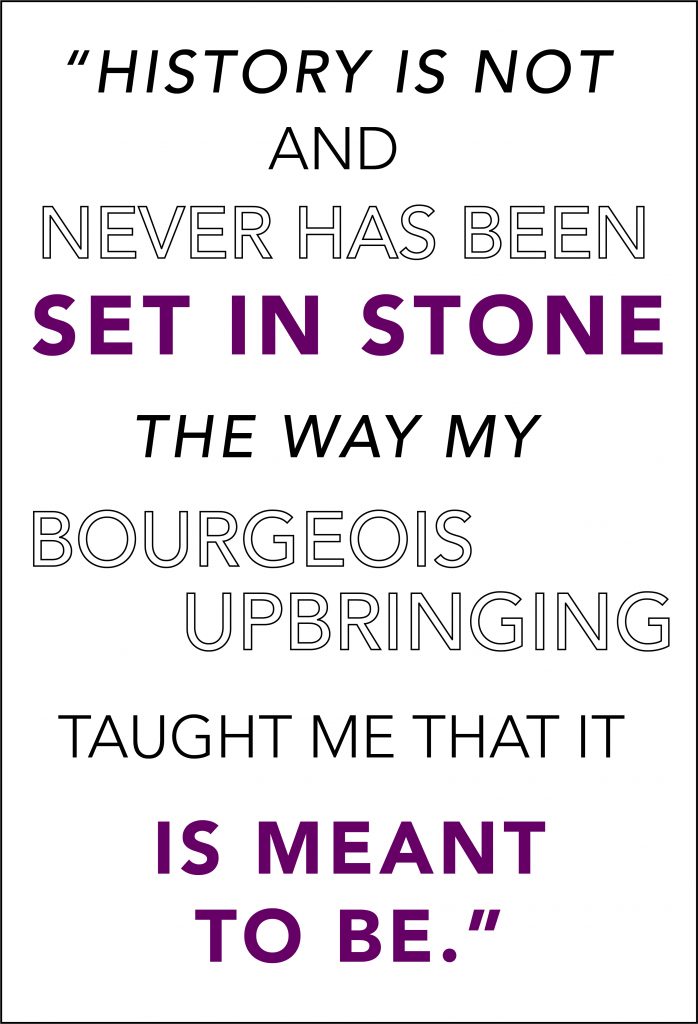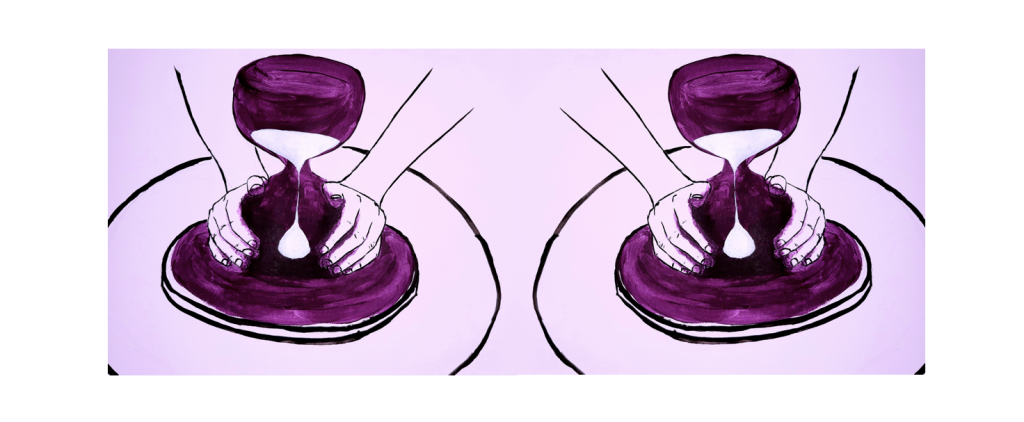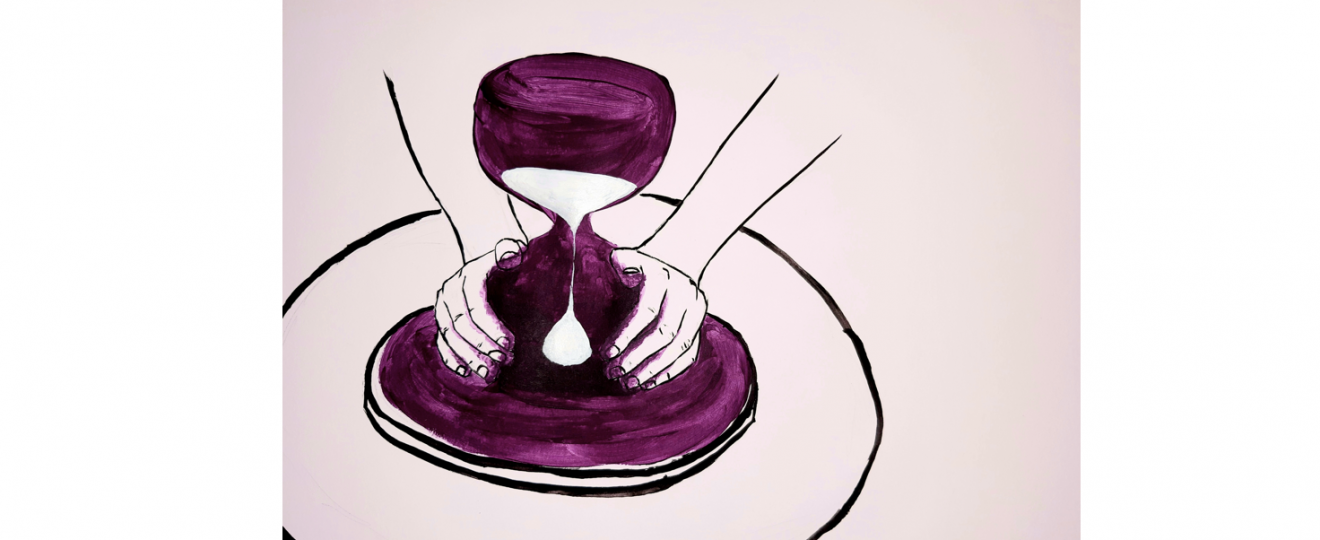To start this article off like a terribly boring wedding toast– Webster’s dictionary defines the word “history” as “events of the past.” Something which when studied, one might assume, comes from observing them from a separate location. With distance between historical events and us there is the inevitable question at hand that we, (and by “we” I mean academics/aspiring academics taught in a Western setting) who haughtily study and observe the events of the past in a sanitized manner. There is a clean break between then and now. It’s almost as though they are characters in a surreal novel from which we can garner theoretical ideas but not concrete truths that continuously affect our lives. This is what we are taught about learning about history in general, or at least this was my experience with history for a very long time. Memorization for the mere sake of memorization- the study of an abstract body of set-in-stone facts.

Majoring in history for the past few years of my life in depth, however, has increasingly taught me that studying it can really just be boiled down to a few things: legacy, perspective, and hindsight. History itself is incredibly important, mainly seeing as it has the capacity to define and shape what we perceive to be true or blatantly false- but this isn’t anything new or fascinating to anyone who has read 1984, or really anything on authoritarianism at all. Time, especially the past, is not something defined or immovable. Treating history like a one-track set of events that once happened without seeing the ever shifting nature of time with hindsight and subjectivity is frankly simply blind.
I read A People’s History of the United States in the eighth grade for the first time in my English humanities class, having previously obtained an incredibly limited amount of knowledge about American history accumulated over the years. I saw it as stuffy and boring, but inevitably factual. Paul Revere, George Washington, Thomas Jefferson… all I knew of them is that they were “great men” whatever “great men” even are. I knew the United States was a country of love, opportunity, growth, and potential, the successful older brother to the north of my forever messed up country full of violence and environmental catastrophe. America the beautiful, if you will.
It is for this reason that Howard Zinn’s searing indictment of everything I mentioned above drove a drill through my brain. The mindless indoctrination I had received while studying history made me really think the past was an unmalleable reality I had to readily accept. What was this about dominating biases in the study of history and understanding the plight of marginalized groups? What do you mean the United States is a country built on and continuously maintained through a legacy of slavery and exploitation? What do you mean colonialism was like- a bad thing?
My teacher taught us about the First Thanksgiving, about the Trail of Tears. She taught us the absurdity of prioritizing and treating Christianity as the only real and valid religious tradition in history as much as in the present. These cracks in the glass made me begin to understand what studying the events of the past really means, and this if anything implies using the present as a building block to see what we could not see at one point in time. History is about uncovering things, finding new perspectives, giving new voice and validity to those who might not have had the opportunity or access to these tools beforehand. History is the tool of the revolutionary, the weapon that destroys mindless traditions and exposes the inhumane nature of so many things that exist around us and have sat there unquestioned for centuries. It is about questioning what we might have always considered fundamentally inevitable.
History is not and never has been set in stone the way my bourgeois upbringing taught me that it is meant to be. Sanitizing it, turning it into something merely notional, intellectual, and out of reach ignores the fundamental implications of history, and that is probably the most heard quote about its study: “Those who cannot learn from history are doomed to repeat it.” So unwilling have we been to learn and engage with those mistakes, observe the power structures that continually subjugate us to the same errors time and time again is our obsession with making history so… boring. These patterns, now more visible to us than ever due to our capacity to communicate with and reach most people and record their history, are dynamic, ever-changing, and heartbreaking as much as they can be inspiring.
Here goes another tired cliché: “History is always written by the victor.” While this is true, that the marginalized have often been cast aside as the narrative belongs to the more powerful, Western, whiter, more male voices- why do we have to continue viewing the past in terms of domination and subjugation? Now that we are aware of this reality, should not progress allow us to move forward from these errors? I believe it is historians who continuously repeat that the real shame is that we continue to repeat the mistakes we have made in the past due to our lack of knowledge about them. Maybe it is really about being brave enough to destroy these clichés, these paradigms and pave the way for a new and improved way to make history accessible and interesting to everyone. At the end of the day, history is a deeply personal matter to the people, and everything aside maybe academia should move to stop making it something that belongs to the handful. We all know the manipulative potential of just that- or do we?

Art by Kate Grant




